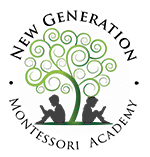What is the Montessori Philosophy?
The Montessori philosophy is solely centered on providing the child with a high-quality environment that comes only second to their home. Similar to their home, where there will be an abundance of love, respect, and care for their community. Treating each child with love and respect enables the child to trust their teachers. This relationship is the foundation of the learning process.
Our promise to you is to help your child develop a great sense of responsibility, order, respect, independence, and self-esteem. Creativity flourishes in an atmosphere of acceptance and trust. These traits will be what will allow your child to meet any opportunities with success.
What is the Montessori Philosophy?
The Montessori philosophy is solely centered on providing the child with a high-quality environment that comes only second to their home. Similar to their home, where there will be an abundance of love, respect, and care for their community.
Maria Montessori History
In 1907, Maria was given the opportunity to open her own childcare in the slums of Rome. Now known as the first Casa dei Bambini, here is where Dr. Montessori perfected her method through observations of the children. Bringing over the material she created in the Orthophrenic school, she created a quality Montessori learning environment for young children, children with no past education, where they were introduced to hand-on lessons of mathematics, language, sensorial, cultural areas and practical life. She began to observe something miraculous: where her children with learning disabilities had to be pushed to advance through this material, the children under her care seemed to be naturally attracted to the work they were introduced.
Maria Montessori History
In 1907, Maria was given the opportunity to open her own childcare in the slums of Rome. Now known as the first Casa dei Bambini, here is where Dr. Montessori perfected her method through observations of the children.
A Prepared Enviroment
One key feature in a Montessori classroom is a prepared environment. Maria Montessori was adamant about having a prepared environment where children could feel as if it was their own special home. With a prepared environment, we no longer seek over-sized shelves and counters to facilitate teachers, but child-sized shelves, chairs, tables and materials to facilitate the child. In our child-centered environments, it is easy for the children to perform various tasks at their own pace, with minimal help from the guide. Our environments are carefully planned to make sure your child never misses a sensitive period, and is always able to master every activity on his own schedule.
A Prepared Enviroment
One key feature in a Montessori classroom is a prepared environment. Maria Montessori was adamant about having a prepared environment where children could feel as if it was their own special home.
The Challenge
The century in which we live has sometimes been called “The Century of the Child”; and certain it is there has never been another epoch in which there have arisen so many movements centered in the child and its welfare. No one has better represented this movement than the great Italian educationalist – Dr. Maria Montessori.
Many others have loved children, worked for them, and with them; but no one has so completely understood the soul of the child in its depth and greatness, in its immense potentialities, and in the mysterious laws of its development.
The Challenge
TheThe century in which we live has sometimes been called “The Century of the Child”; and certain it is there has never been another epoch in which there have arisen so many movements centered in the child and its welfare.
Maria Montessori’s Biography
Maria Montessori was born on the 31st August 1870 in the town of Chiaravalle, Italy. Her father, Alessandro, was an accountant in the civil service, and her mother, Renilde Stoppani, was well educated and had a passion for reading.
The Montessori family moved to Rome in 1875, and the following year the young Maria enrolled in the local state school on the Via di San Nicolo da Tolentino. As her education progressed, she began to break through the barriers which constrained women’s careers. From 1886 to 1890 she continued her studies at the Regio Istituto Tecnico Leonardo da Vinci, which she entered with the intention of becoming an engineer. This was unusual at the time as most girls who pursued secondary education studied the classics rather than going to technical school.
Maria Montessori’s Biography
Maria Montessori was born on the 31st August 1870 in the town of Chiaravalle, Italy. Her father, Alessandro, was an accountant in the civil service, and her mother, Renilde Stoppani, was well educated and had a passion for reading.
Montessori’s Famous Students
There have been many ‘famous’ people that attended a Montessori school during some stage of their life. While one can argue, that there are many successful people who were not exposed to Montessori education, interesting is that many of those who attended Montessori school praise it as one of the important success factors.
We cannot create observers by saying ‘observe’, but by giving them the power and the means for this observation and these means are procured through education of the senses.

